Triumphs, Tragedy, and Titles: 100 Seasons of BU Men’s Hockey

The first-ever Boston University hockey game was played on February 6, 1918, at Boston Arena against a group from Boston College. BC won the contest, 3-1. All photos courtesy of BU Athletics
Triumphs, Tragedy, and Titles: 100 Seasons of BU Men’s Hockey
Stories and photos through Terrier hockey history, from the 1936 Olympics to the early days of the Beanpot to NCAA titles to the great Russian upset to Jack Parker, Chris Drury, Travis Roy to the first Black college hockey coach and more
On February 6, 1918, 11 young men from Boston University gathered at Boston Arena for the first official ice hockey game in their school’s history, meeting a team from Boston College.
“In those days, it was like a challenge,” BU hockey radio broadcaster and historian Bernie Corbett (CAS’83) says. “BC got some guys together and said, ‘We’re the BC team. We’re going to play BU, so you put a team together.’” And they did.
By 1922, the BU hockey team had an organized schedule, an established home at Boston Arena, and a school mascot. The Terriers have played a competitive season almost every year since, pausing only during World War II.
The 2021–22 season marks the 100th campaign of BU hockey, celebrating a period filled with championship celebrations, heartbreaking losses, and more than a century’s worth of unrivaled success and unimaginable adversity (not to mention 30 Beanpot titles, 14 conference tournament titles, and 5 national championships).
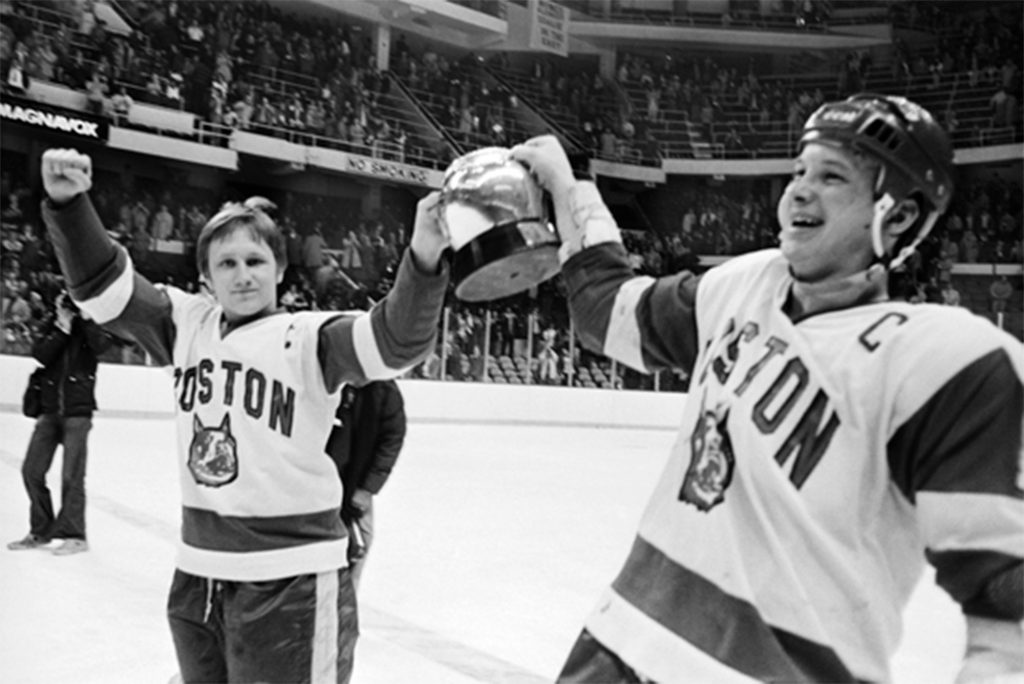
If you’ve watched any game in the National Hockey League over the last several decades, chances are good there’s been a Terrier on the ice. Close to 100 have played in the NHL, including 20 currently, and many more have played professionally abroad.
Maybe it was the proximity of the Boston Bruins, one of the Original Six teams from the early days of the NHL (1942 to 1967), or maybe it was the growing presence of other college teams around the city. For whatever reason, hockey seemed destined to soar on Comm Ave. “The University has always wanted a successful college hockey program,” says legendary BU captain and coach Jack Parker (Questrom’68, Hon.’97). “It’s been a big part of the fabric of this University for a long, long time.”
Boston Arena was the first site of BU men’s hockey and seven other nearby college teams. Because of the localized competition, the Terriers played 480 of their first 874 games at Boston Arena, meaning 55 percent of BU’s games through half a century were skated on the same sheet of ice.
“You cannot underestimate the supreme importance of Boston Arena. That was the place,” Corbett says. “Boston Arena functioned 24-7 because there was no other indoor ice facility.”
Boston Arena still stands today as Matthews Arena, the world’s oldest active multipurpose arena and Northeastern’s home rink, where the Terriers continue to play annually, only now as the visiting team. BU and Northeastern met at Boston Arena in the first-ever Beanpot game, a 4-1 Terrier victory, on December 26, 1952.
BU’s first long-tenured coach was Wayland Vaughan, who Corbett calls “the father of BU hockey.” Vaughan totaled 87 wins, 82 losses, and 8 ties in his years with BU, from 1928 to 1943. He oversaw some of the school’s original stars, including 1934-35 cocaptains John Lax (Wheelock’36) and Paul Rowe (Questrom’35), who led Team USA to a bronze medal at the 1936 Olympics in Nazi Germany.
When BU hockey resumed after a two-year hiatus during World War II, Harry Cleverly (Wheelock’37) took the helm, guiding the Terriers to 212 wins, 142 losses, and 10 ties in 17 years, from 1945 to 1962. “He’s the guy that put them on the map early on after the war,” Corbett says.
The BU men’s hockey program has also played an important role in the integration of Black players into the sport. Mike Grier starred for BU in the mid-1990s, and enjoyed a stellar, 14-year career in the National Hockey League, where he became the first American-born Black player to score 20 goals in a season. Jordan Greenway (CGS’17, CAS’19) in 2018 was the first Black hockey player to play for Team USA in the Winter Olympics. Eddie Wright (’69) played for Jack Kelley in the late 1960s, and went on to be the first Black NCAA hockey coach, helming University of Buffalo. And Lloyd Robinson (SED’50) is regarded as the player who broke the NCAA color barrier in hockey when he joined the Terriers for the 1947-48 season.
With the help of Jack Garrity (Wheelock’51,’59), the program’s all-time single-season leader in goals (51) and points (84), Cleverly helped BU to its first national tournament appearance, a 4-3 victory over Michigan on March 17, 1950. Cleverly also secured BU’s first Beanpot title, when the Terriers defeated Northeastern 9-3 on February 20, 1958, at Boston Garden, the host of the Beanpot for 43 years.
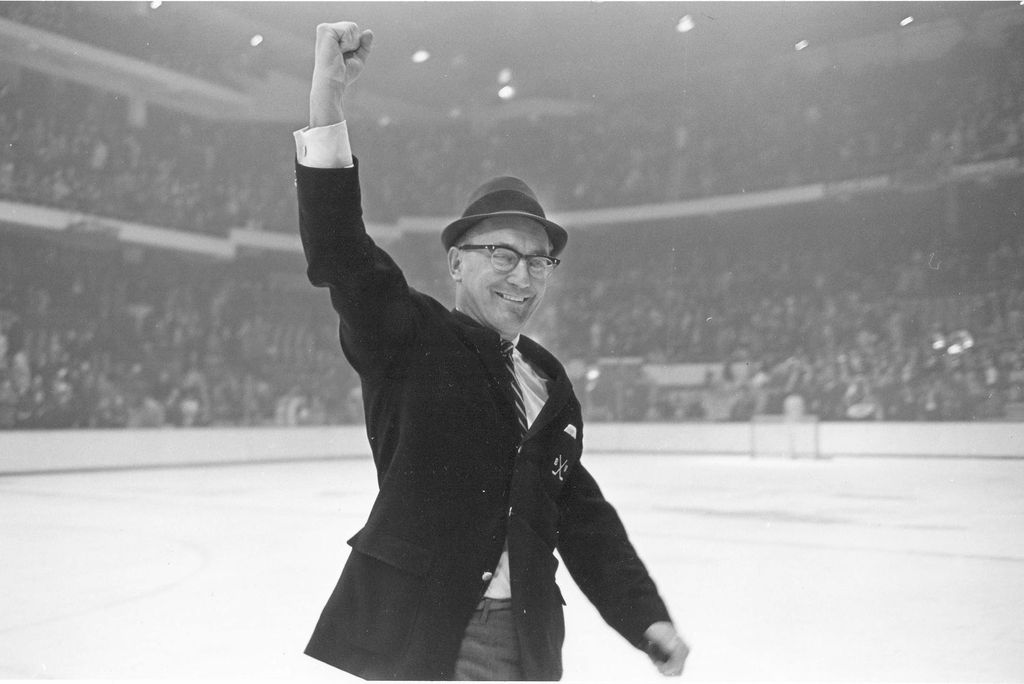
After Cleverly brought the Terriers to the national stage, Jack Kelley only further fixed the spotlight on BU hockey in his decade behind the bench. “BU hockey was an established program before Jack Kelley arrived, but he put it on the level that it is today,” Parker says.
Kelley directed the program from 1962 to 1972, posting 206 wins, 80 losses, and 7 ties. After reaching the national tournament in 1966 and 1967, Kelley and the Terriers broke through in 1971 for the program’s first national championship, a 4-2 win over Minnesota. BU lost just twice in that 1970-71 campaign, and after a 4-2 defeat to Harvard in the Eastern College Athletic Conference (ECAC) semifinals, the national tournament selection committee made the unprecedented decision to invite the Terriers to the four-team tournament despite the team not reaching the ECAC final. The Terriers validated the invitation by taking the championship.
“I think everybody would perceive the 1971 team being the best team in BU history, and I would argue that it might be the best team in college hockey history,” Parker says. “I don’t think anybody could have predicted how dominant they would be, except the guys that were on the team themselves.”
Goaltender Tim Regan (Wheelock’72) set program single-season records for save percentage (.929) and goals-against average (1.77) in the 1970-71 season, and was one of many Terriers to return for the 1971-72 campaign. The end result was the same: with a 4-0 victory over rival Cornell on March 18, 1972, BU won its second consecutive national title, a rare feat in college hockey at the time.
“Once every 10 years, an eastern school might win the national championship. It was dominated by the Western Collegiate Hockey Association [WCHA] teams,” Parker says. “For an eastern school to win it, and then win it again, kind of put BU on a level above everyone else.”
That 1971-72 campaign marked the first time BU won the Beanpot, ECAC title, and national championship in the same season. The program also moved into its own on-campus hockey rink that year: Walter Brown Arena. The Terriers opened their home arena with a 6-3 win against Yale on November 27, 1971, quickly creating one of the best home ice advantages in the nation.
“That place was rocking,” Corbett says. “When you had 3,800 people and a big game, it was pretty crazy.”
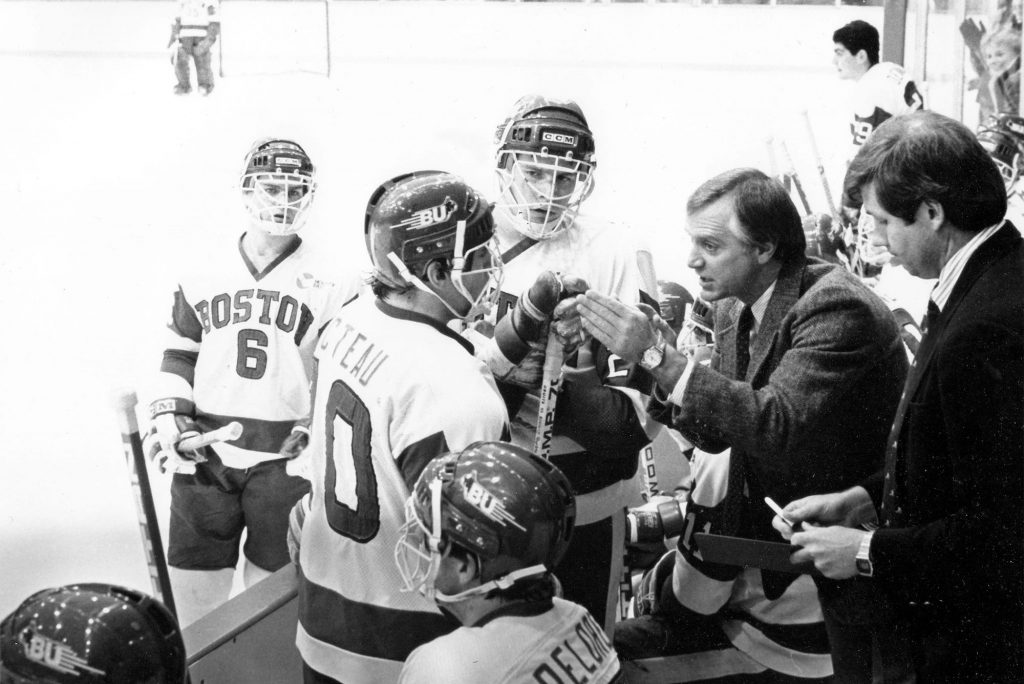
Walter Brown Arena was Jack Kelley’s vision, but he spent only one season at the new venue. Midway through the 1972-73 campaign, 28-year-old Parker began his 40-year tenure in charge of the team he played for from 1965 to 1968, captaining BU in the 1967-68 season.
Kelley’s success “was a blueprint for me, and it was a benchmark for our teams,” Parker says. “He pushed everybody to give their best effort all the time. By demanding that day in and day out, I think the team got the feeling that: we deserve this. We’ve outworked everybody else.’”
It didn’t take long for Parker to match the success of his former coach. After winning the ECAC championship four years in a row, from 1974 to 1977, BU claimed its third national title in less than a decade with a 5-3 win over Boston College in March 1978.
Brian Durocher (Wheelock’78), who has coached the BU women’s hockey team since it became a varsity program in 2005, was a goaltender and cocaptain of the 1977-78 men’s team that capped off the program’s defining decade. “That was an era of dominance and a super high point for BU hockey,” he says.
Durocher shared the net with Jim Craig (Wheelock’80, MET’09), who would go on to become one of four Terriers—alongside Mike Eruzione (Wheelock’77), Jack O’Callahan (CAS’79), and Dave Silk (CAS’80, MET’92, Questrom’94)—on the history-making United States squad that first upset the Soviet Union at the 1980 Olympics in Lake Placid, N.Y., (“Do you believe in miracles? Yes!”) and then went on to beat Finland for the gold medal.
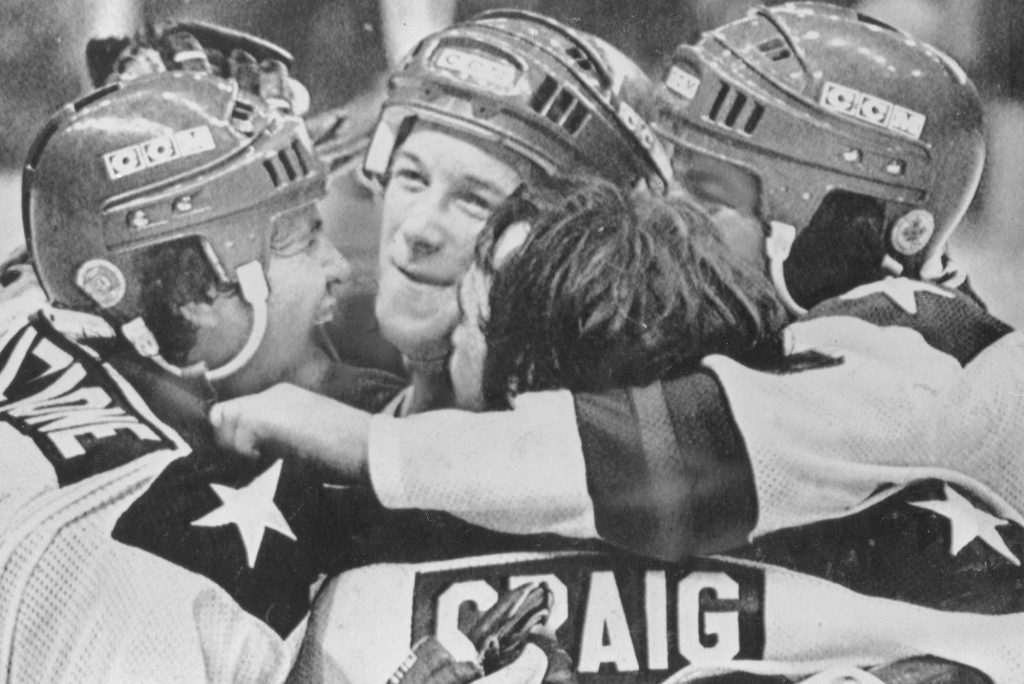
Seeing “the BU Four” win with Team USA was a highlight of the 1980s for the program, which reached the national tournament twice that decade, in 1984 and 1986. In that time, John Cullen (Questrom’87) set the record for most points by any Terrier, tallying 241 through his four-year career, from 1983 to 1987, which was bisected by BU’s move from the ECAC to Hockey East, which was founded in 1984.
“Talk about landing on your feet,” Corbett says. “Hockey East had instant credibility because the WCHA needed games, and they cut a deal [with Hockey East] to play this interlocking schedule, which is the best thing to ever happen to college hockey. It was good for everybody.”
BU went on to win the Hockey East trophy five times between 1986 and 1997. After an NCAA final loss in 1994, the Terriers won it all a year later, taking the Beanpot and Hockey East before winning their fourth NCAA title in 1995 in a 6-2 win over Maine.
“I think [the loss in the 1994 NCAA final] spurred us the next year,” Parker says. “It was a team that was easy to coach because of the leadership, easy to coach because of the talent, and really easy to coach because of the motivation from the year before.”
He says that was a common recipe for BU’s strongest teams: “The really great players were competitive and they were skilled, but they also were people that cared about their teammates.” Parker also noticed a shift in the landscape of college hockey in that era. “By the 1990s, college hockey was supplying a lot of players to the NHL,” he says. “There were a whole bunch of NHLers on that 1995 team.”
Current BU men’s hockey coach Albie O’Connell (CAS’99) was one of those players with professional aspirations, skating at BU from 1995 to 1999 and serving as captain for the 1998-99 season. He was with the team for four of its Beanpot-best six straight titles, from 1995 to 2000.
“Playing beyond here is even more realistic than it was in the past. It wasn’t as common,” O’Connell says. “College hockey has become a breeding ground for the National Hockey League.”
Prior to his 14-year NHL career, Chris Drury (CAS’98) was a member of the 1995 national championship team and in 1998 won the Hobey Baker Award, presented to “college hockey’s finest player.” He holds the record for most goals scored in a Terrier career, potting 113 from 1994 to 1998.
Only months after winning a national championship, an unthinkable tragedy struck the Terriers and the BU program in the opening moments of the 1995-96 campaign. Making his college debut on October 20, 1995, freshman Travis Roy suffered a spinal cord injury 11 seconds into his first shift at BU, ending his hockey career and leaving him a quadriplegic until his death on October 29, 2020, at the age of 45.
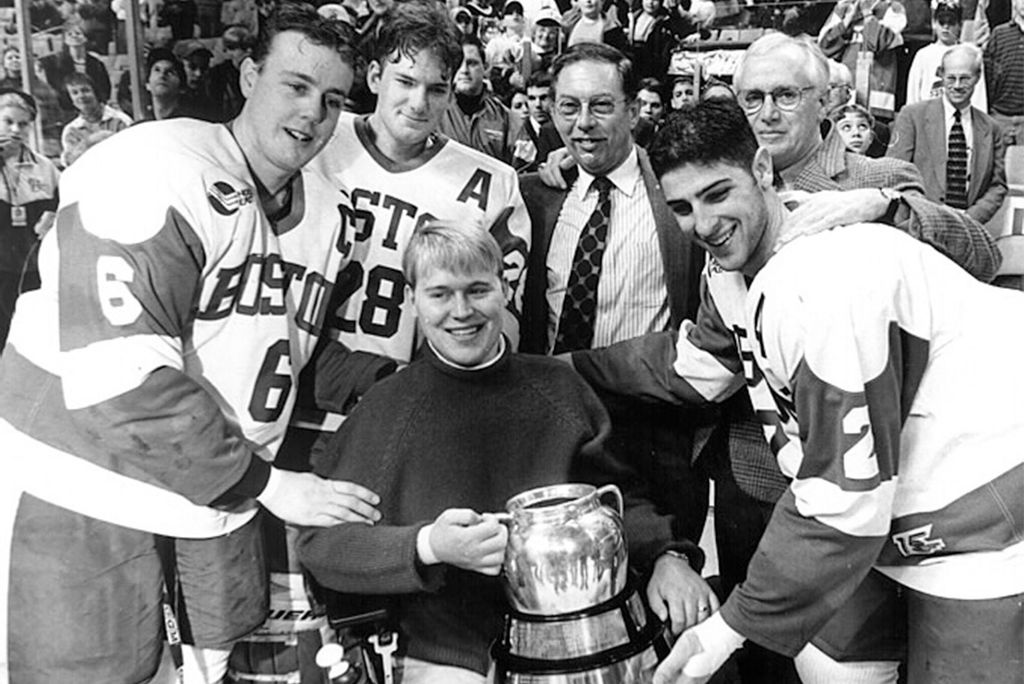
In the 25 years he lived after his accident, Roy (COM’00, Hon.’16) and those around him turned his condition into a source of positive change. Along with completing speaking engagements and visits to those with similar spinal cord injuries, Roy founded the Travis Roy Foundation, which has raised more than $21 million.
“Right from that moment, I remember everybody rallying and everybody becoming active. It was just that mentality of ‘what can we do,’” Corbett says. “With what he became, what he meant to people, and how he positively impacted people—what a legacy. And it will live on.”
Roy’s number, 24, became the first retired number in BU hockey history on October 31, 1999, and the program kept him in mind when plans began for its new arena, which was inspired by Parker and includes one-of-a-kind elements catered to those, like Roy, with accessibility needs.
Agganis Arena opened on January 3, 2005, with a 2-1 BU win over Minnesota, which had beaten the Terriers 2-1 in their final game at Walter Brown Arena the night before. With double the capacity of its predecessor and elite amenities, Agganis Arena became an immediate symbol of the BU community’s support for hockey.
“Our facilities are great,” O’Connell says. “It’s a program that really gets supported by the administration and a fan base that’s pretty fanatical about wanting a winner.”
“In my day, not many kids were wearing BU paraphernalia,” Durocher adds. “Now, they wear it proudly. [BU] rides shotgun with a lot of the elite institutions that we didn’t back then.”
The Terriers treated fans to their fifth national championship in 2009, when they completed another sweep of Beanpot, Hockey East, and NCAA trophies, winning the national title 4-3 in a thrilling last-minute, come-from-behind shocker against Miami University of Ohio. Trailing by two goals with a minute to go and the Terrier goaltender on the bench to allow for an extra skater, BU scored twice and deposited a game-winner in overtime to steal the victory. Matt Gilroy (MET’09) assisted the game-tying goal and went on to win the 2009 Hobey Baker Award.
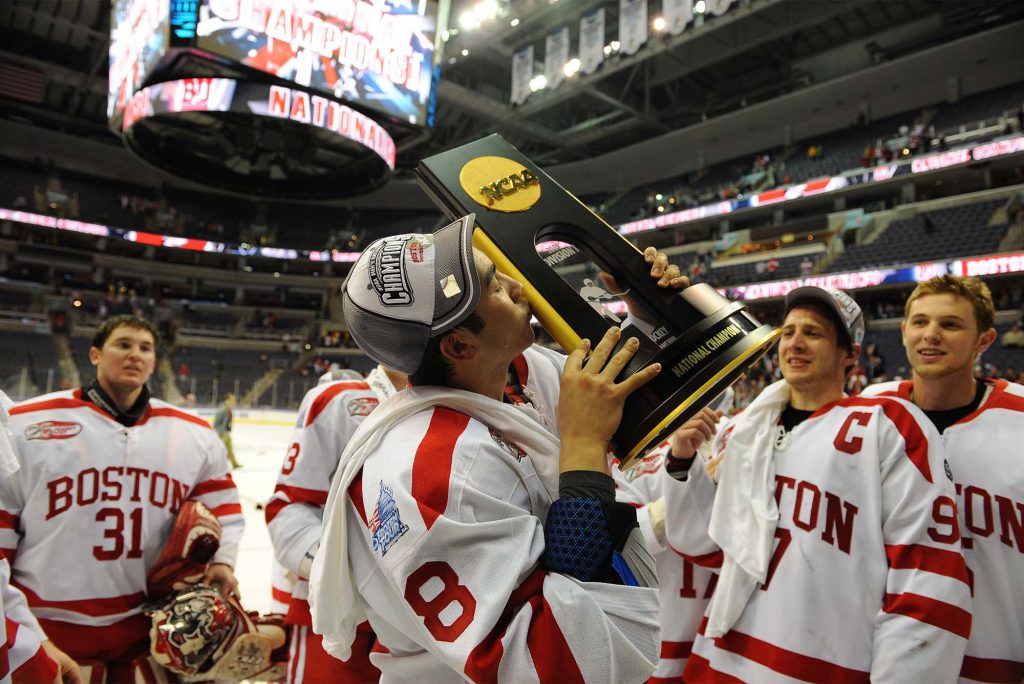
“It was absolutely fortunate that we won that game,” Parker says. “It couldn’t happen too often, that you’re going to get two goals after pulling the goalie. And you certainly aren’t going to get two goals in the last minute. But we played great—great players made great plays.”
Parker retired four years later, in 2013, ending his 40-year BU career with 897 wins, 472 losses, and 115 ties. His wins rank third among all college hockey coaches and are the most at a single school; his total of 1,484 games behind a college bench stands third all-time, as well.
Durocher especially commends Parker’s adaptability. “He found a way to change from the beginning to the end,” Durocher says. “He knew how to manage people—deal with the wise guy, deal with the shy kid, deal with the cocky kid. Nobody ever got the upper hand on him.”
Parker says he enjoyed the relationships the most. “The best part of my job was my relationships with my players when I was coaching them, and the relationship I’ve had with my players since I graduated,” he says. “I always tell people I have 2 daughters and 262 sons.”
David Quinn (CAS’89) had big shoes to fill as BU’s next head coach, and the former Terrier skater (1984 to 1988) delivered in 2015, when BU won the Beanpot and Hockey East title before coming one win away from a sixth national championship, falling to Providence 4-3 at Boston’s TD Garden.
Freshman sensation Jack Eichel (CGS’16) won the Hobey Baker Award in 2015 and became one of 23 Terriers selected in the first round of the NHL Entry Draft.
Quinn totaled 105 wins, 68 losses, and 21 ties in five years at BU, and when he moved on to lead the NHL’s New York Rangers in 2018, O’Connell became head coach. His most successful season so far came a year ago when the Terriers reached the 2021 NCAA tournament despite playing only 16 games in a campaign that was shortened by the COVID-19 pandemic.
To date, BU men’s hockey has amassed 1,604 wins in 2,738 games, earning a total 65 trophies—Beanpot, conference, and national.
“I would say we’re in the top five all-time brand-name college hockey programs, and I don’t think anybody would argue with that,” Parker says. “BU is in the same conversation as any other great college hockey program.”
As for the fans, Parker says, “People come here from out of this country who never saw a college hockey game before. They come and they get enthralled with the sport.”
As the game has grown, the program has, too, from those 11 local boys with skates back in 1918 to the elite young talent that populates the team today.
Editor’s note: This story was updated February 7 to include the important role BU Men’s Hockey has played in integrating Black players and coaches into the sport.

After a two-year pause during World War II, BU hockey resumed in 1945 and has played a competitive season every year since. The 1947 team is pictured here.
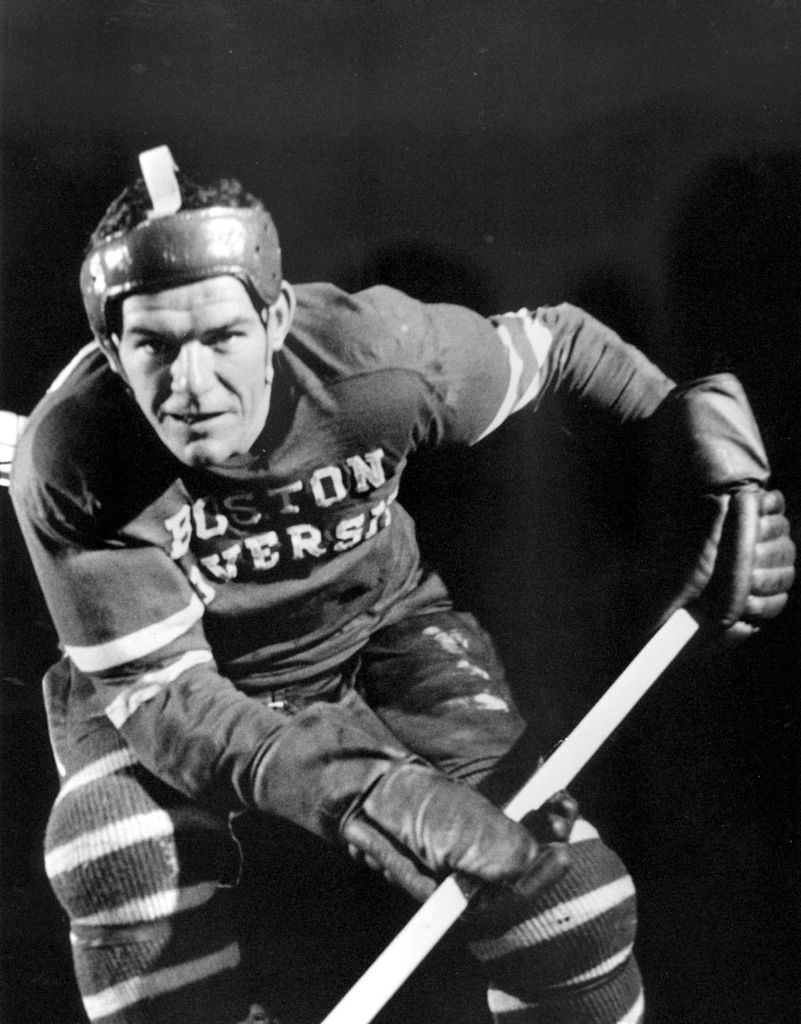
Jack Garrity (Wheelock’51,’59) was one of BU’s first star players, tallying a program-best 51 goals and 84 points en route to BU’s first national tournament appearance in 1950. Garrity was inducted into the United States Hockey Hall of Fame in 1986.
After a two-year pause during World War II, BU hockey resumed in 1945 and has played a competitive season every year since. The 1947 team is pictured here (left). | Jack Garrity (Wheelock’51,’59) was one of BU’s first star players, tallying a program-best 51 goals and 84 points en route to BU’s first national tournament appearance in 1950; Garrity was inducted into the United States Hockey Hall of Fame in 1986 (right).
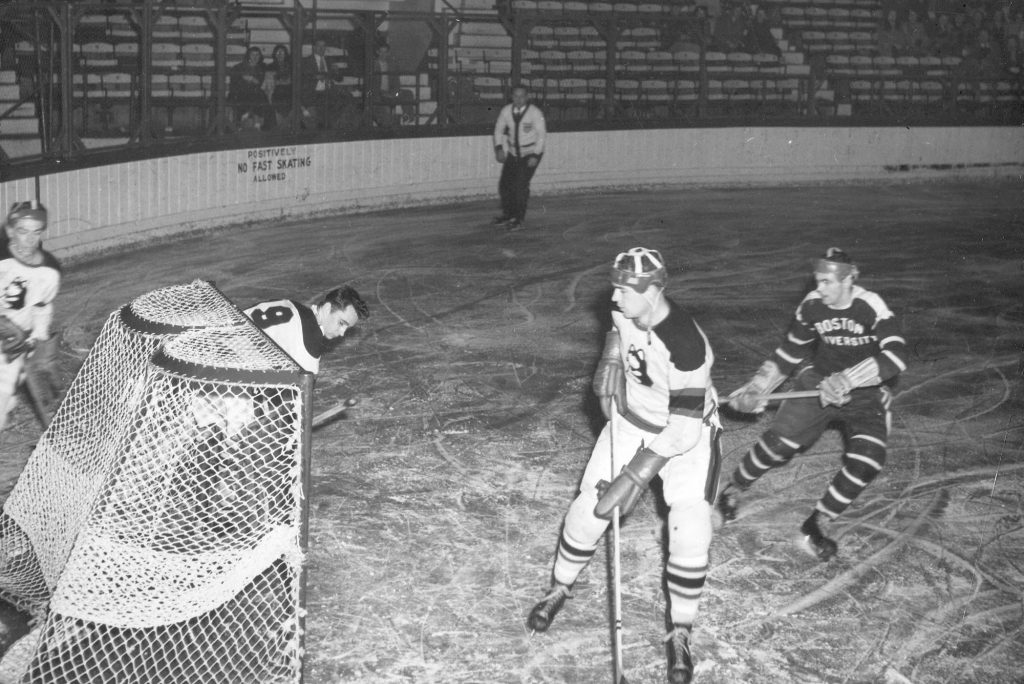
Boston University and Northeastern during a 1949 game at Boston Arena (now Matthews Arena), then home to both teams. The Terriers and Huskies have been competing against each other since 1943.
Boston University and Northeastern during a 1949 game at Boston Arena (now Matthews Arena), then home to both teams. The Terriers and Huskies have been competing against each other since 1943.
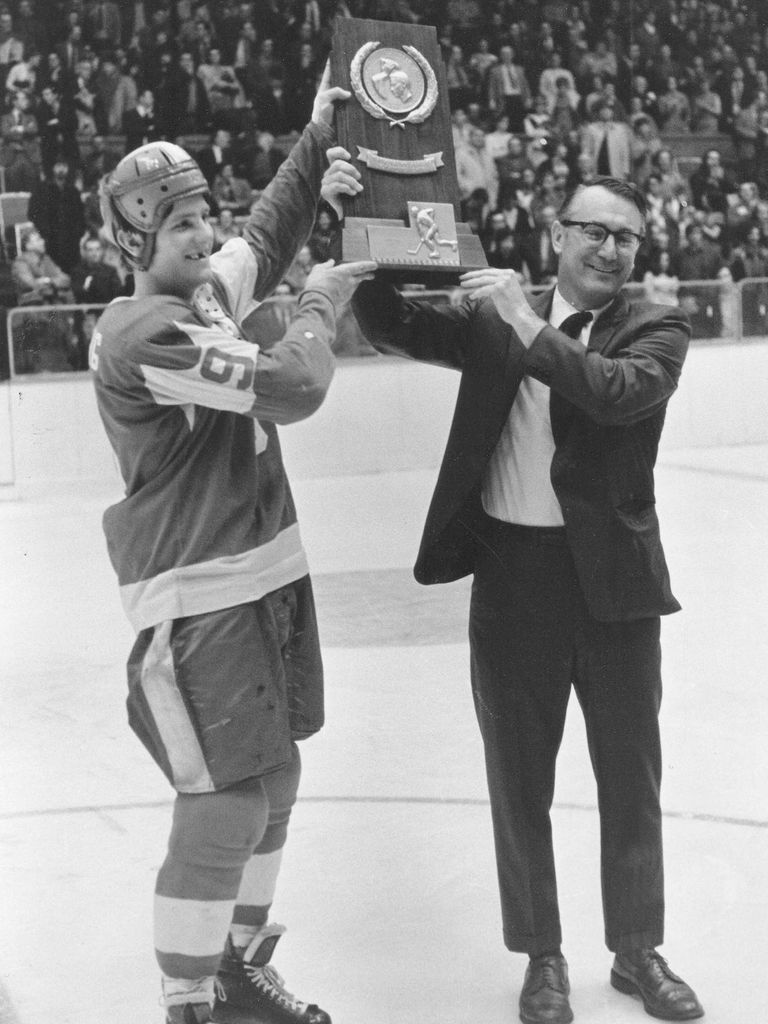
Head coach Jack Kelley (right) and captain Steven Stirling (Wheelock’71,’81) hoisting BU’s first national championship trophy in 1971.
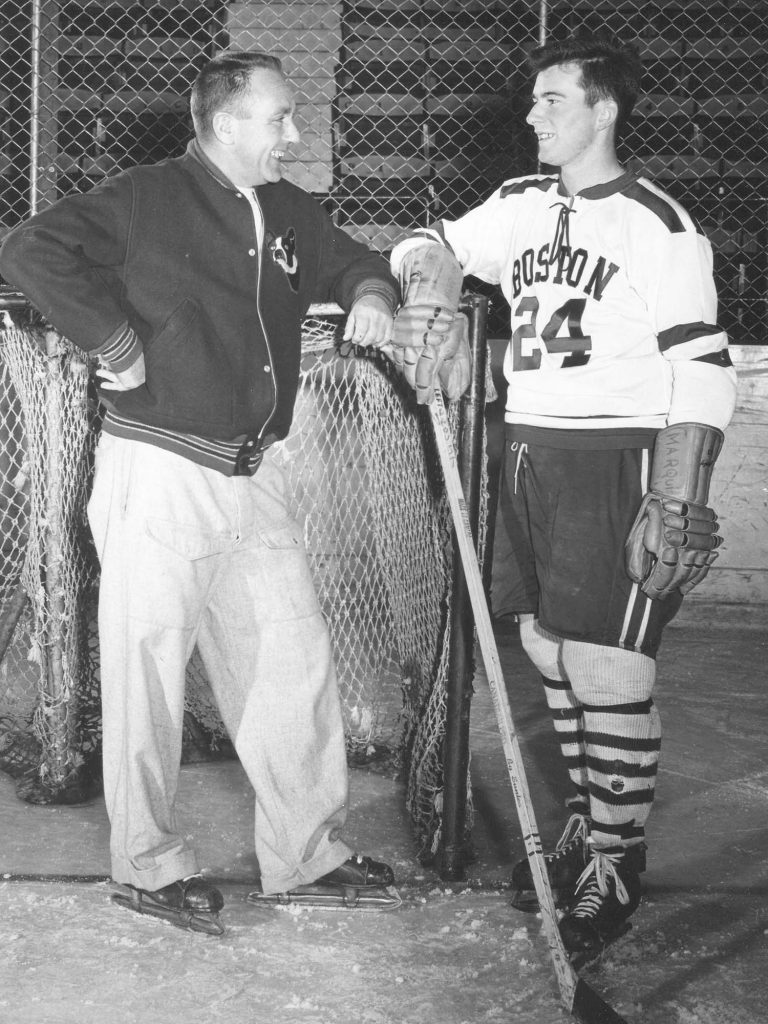
Harry Cleverly (left), who coached BU for 17 seasons (1946 to 1962), with captain Robert Marquis (ENG’60) during the 1960 season.
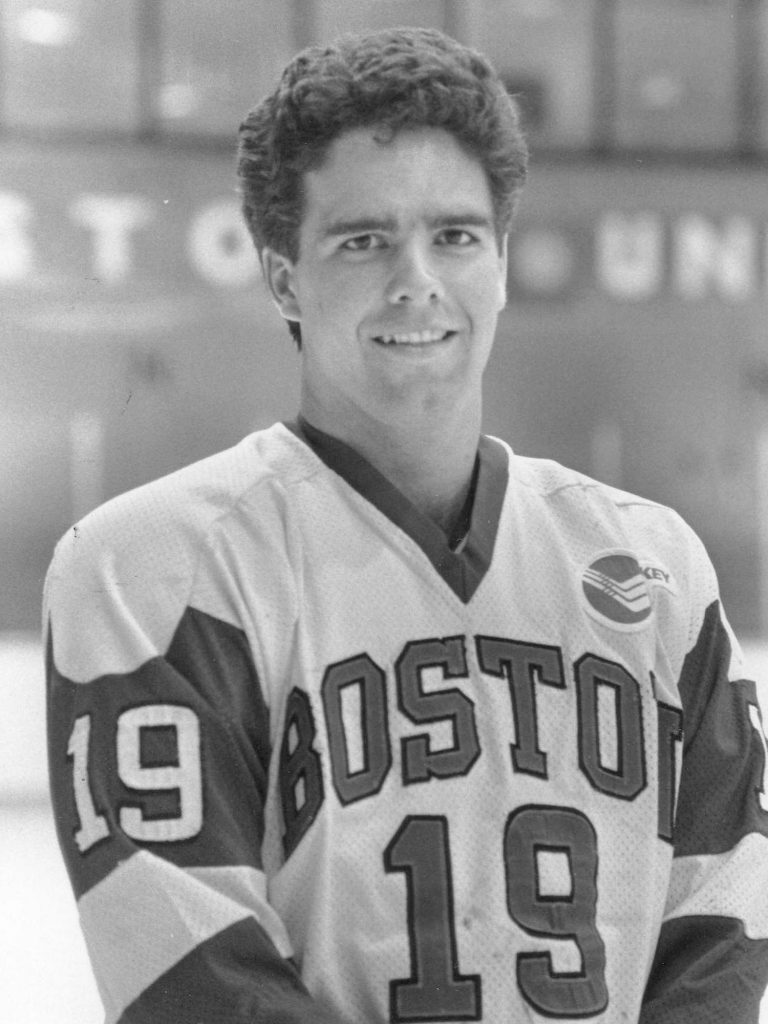
John Cullen (Questrom’87) recorded 241 points in his four-year career, the most points of any player in Terrier history.
Head coach Jack Kelley and captain Steven Stirling (Wheelock’71,’81) hoisting BU’s first national championship trophy in 1971 (left). | Harry Cleverly (Wheelock’37), who coached BU for 17 seasons (1946 to 1962), with captain Robert Marquis (ENG’60) during the 1960 season (center). | John Cullen (Questrom’87) recorded 241 points in his four-year career, the most points of any player in Terrier history (right).
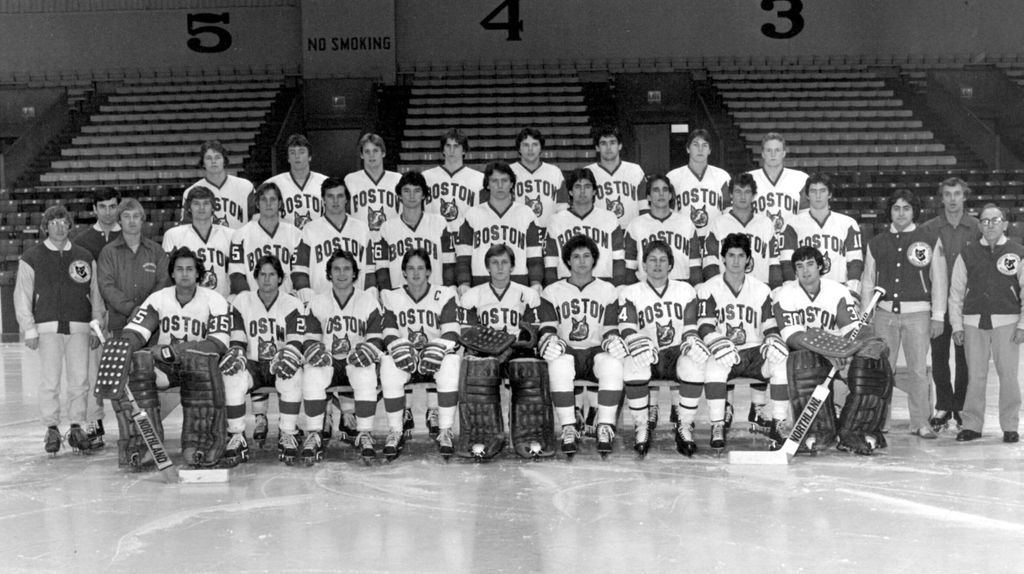
The 1977-78 squad, cocaptained by current BU women’s hockey head coach Brian Durocher (Wheelock’78) (center), won the program’s third national championship.
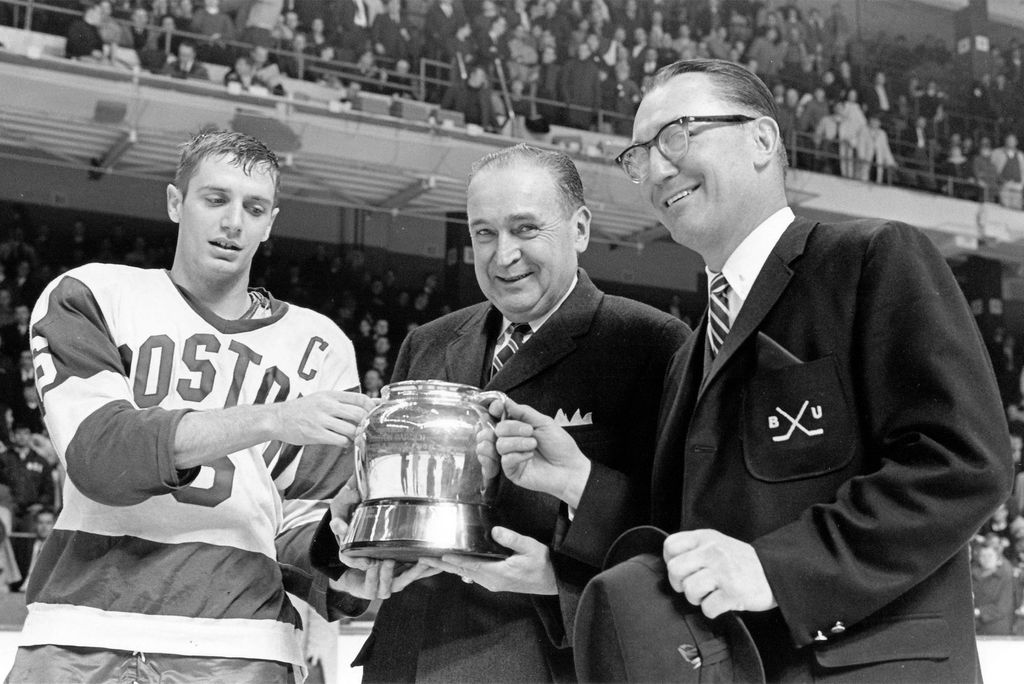
Before becoming BU’s head coach, Jack Parker (Questrom’68, Hon.’97) (left) was the captain of the Beanpot-winning team in 1968, coached by head coach Jack Kelley (right).
The 1977-78 squad, cocaptained by current BU women’s hockey head coach Brian Durocher (Wheelock’78). center, won the program’s third national championship (left). | Before becoming BU’s head coach, Jack Parker (Questrom’68, Hon.’97) was the captain of the Beanpot-winning team in 1968, coached by head coach Jack Kelley (right).
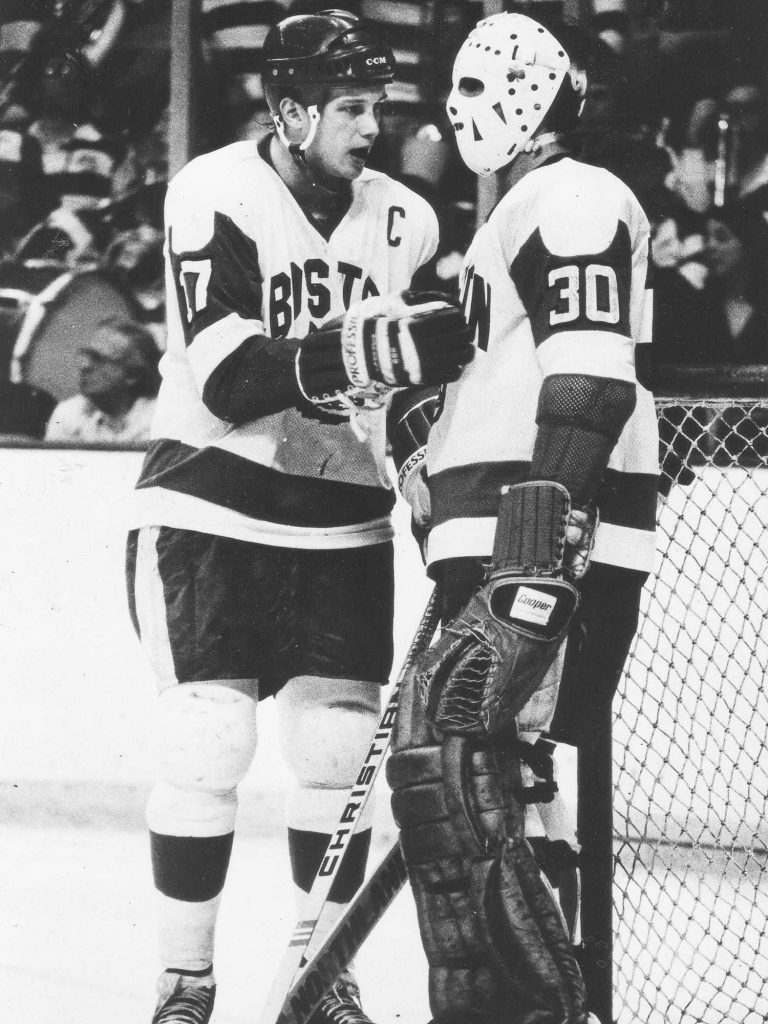
Jack O’Callahan (CAS’79) (left) and Jim Craig (Wheelock’80, MET’09) played together on the 1978-79 BU team. Both went on to become gold medal-winning Olympians in 1980.
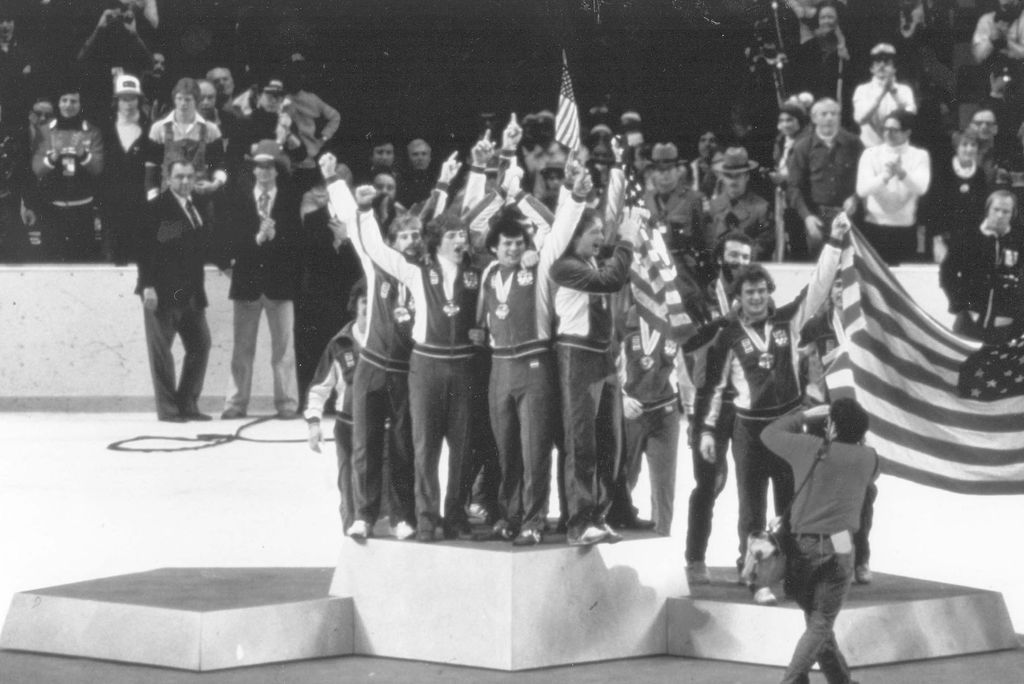
Team captain Mike Eruzione (Wheelock’77) holding the American flag after the 1980 United States Olympic hockey team won the gold medal.
Jack O’Callahan (CAS’79), and goaltender Jim Craig (Wheelock’80, MET’09) played together on the 1978-79 BU team. Both went on to become gold medal–winning Olympians in 1980 (left). | USA team captain Mike Eruzione (Wheelock’77) holding the American flag after the 1980 United States Olympic hockey team won the gold medal (right).

The Terriers ended a 27-year national championship drought when they won the NCAA trophy in 1995.

In 1999, Travis Roy (COM’00, Hon.’16) became the first Terrier to have his number retired. He returned to Walter Brown Arena for the ceremony four years after being paralyzed during his first game in 1995.
The Terriers ended a 16-year national championship drought when they won the NCAA trophy in 1995 (left). | In 1999, Travis Roy (COM’00, Hon.’16) became the first Terrier to have his number retired. He returned to Walter Brown Arena for the ceremony four years after being paralyzed during his first game in 1995 (right).
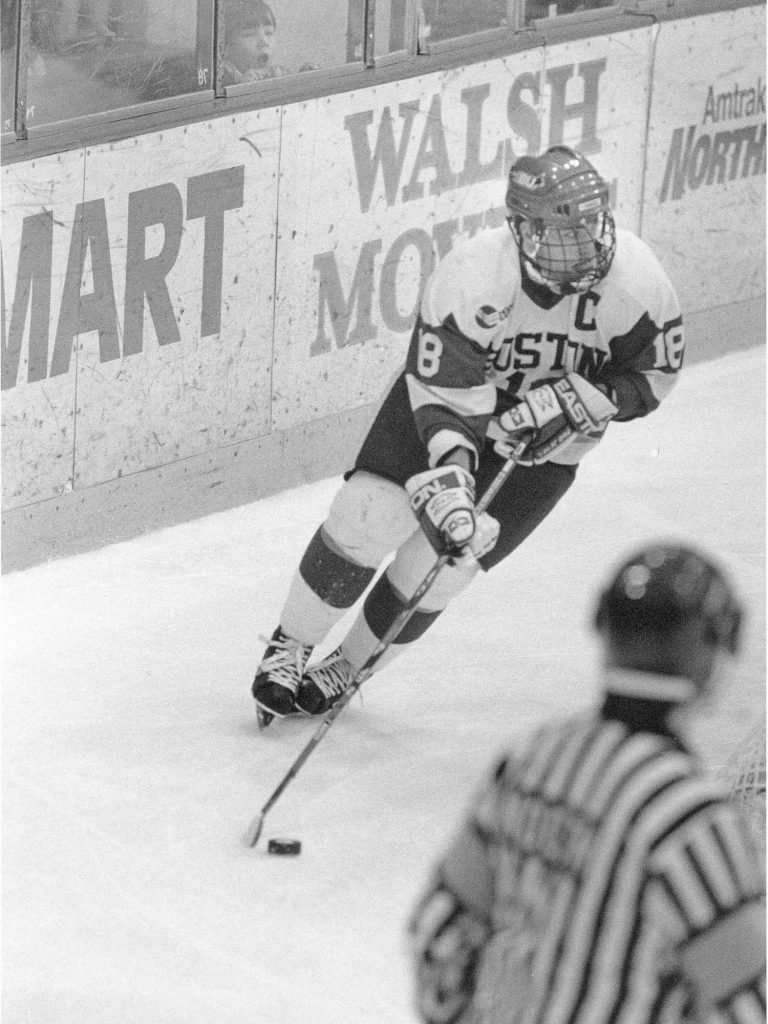
Chris Drury (CAS’98) scored 113 goals as a Terrier, the most goals scored by any player in team history, was on the 1995 national championship team, and won the 1998 Hobey Baker Award. He went on to play professionally in the NHL and is currently president and general manager of the New York Rangers.
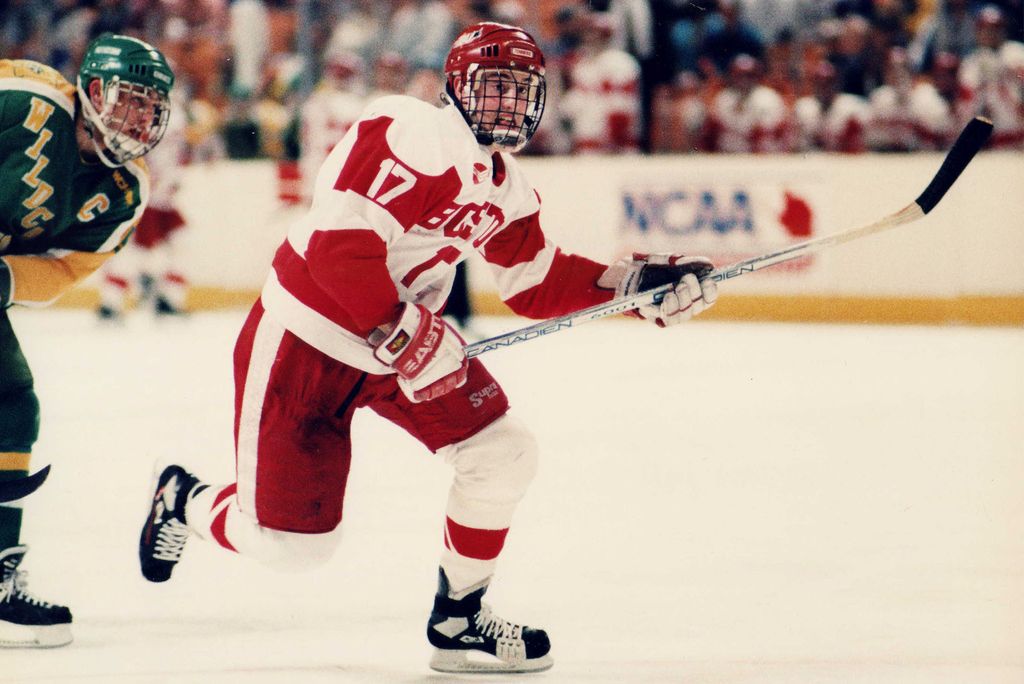
Jay Pandolfo (CAS’96), a member of the 1995 NCAA champion team, returned to his alma mater as BU’s associate head coach in 2021.

Matt Gilroy (MET’09) made the most of his senior season in 2009, winning the Hobey Baker Award and captaining BU to its fifth national championship.
Chris Drury (CAS’98), who scored 113 goals as a Terrier, the most goals scored by any player in team history, was on the 1995 NCAA championship team and won the 1998 Hobey Baker Award. He went on to play professionally in the NHL and is currently president and general manager of the New York Rangers (left). | Jay Pandolfo (CAS’96), a member of the 1995 NCAA champion team, returned to his alma mater as BU’s associate head coach in 2021 (center). | Matt Gilroy (MET’09) made the most of his senior season in 2009, winning the Hobey Baker Award and captaining BU to its fifth national championship. (right)
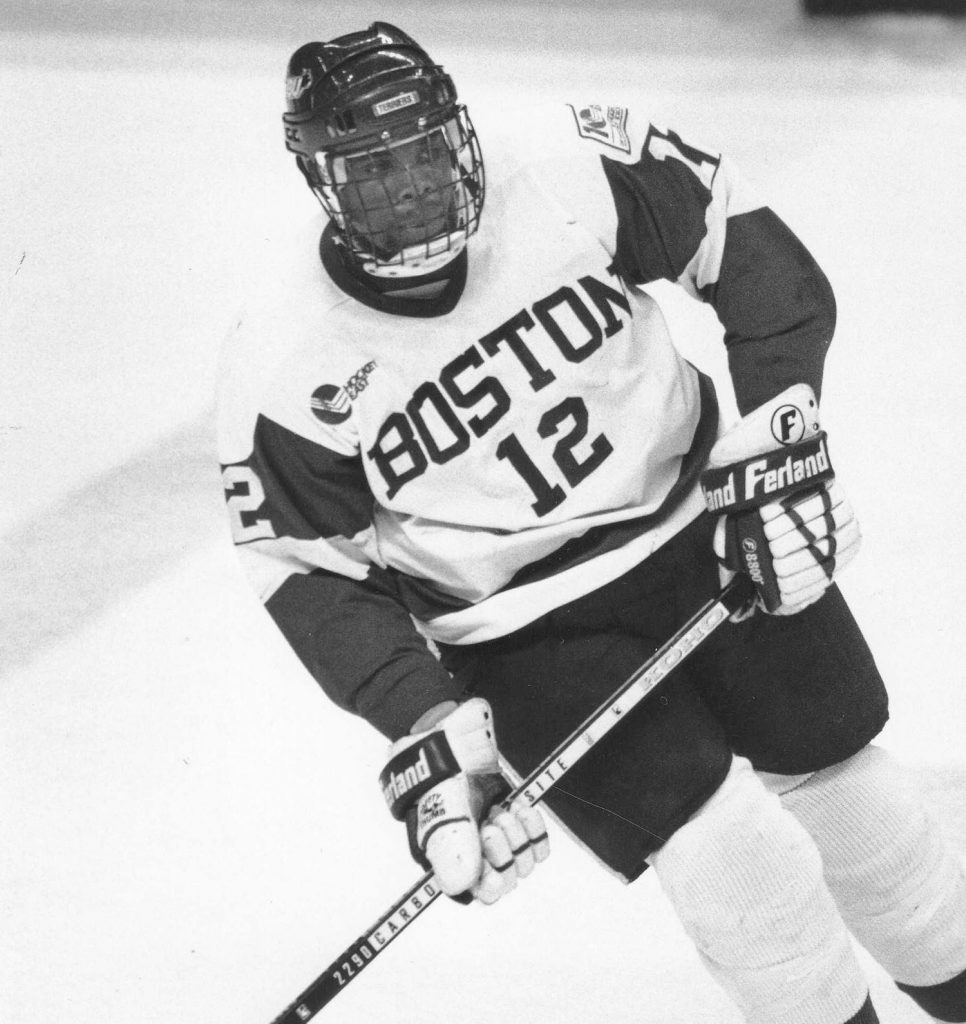
Mike Grier starred for BU in the mid-1990s, and enjoyed a stellar, 14-year career in the National Hockey League, where he became the first American-born Black player to score 20 goals in a season
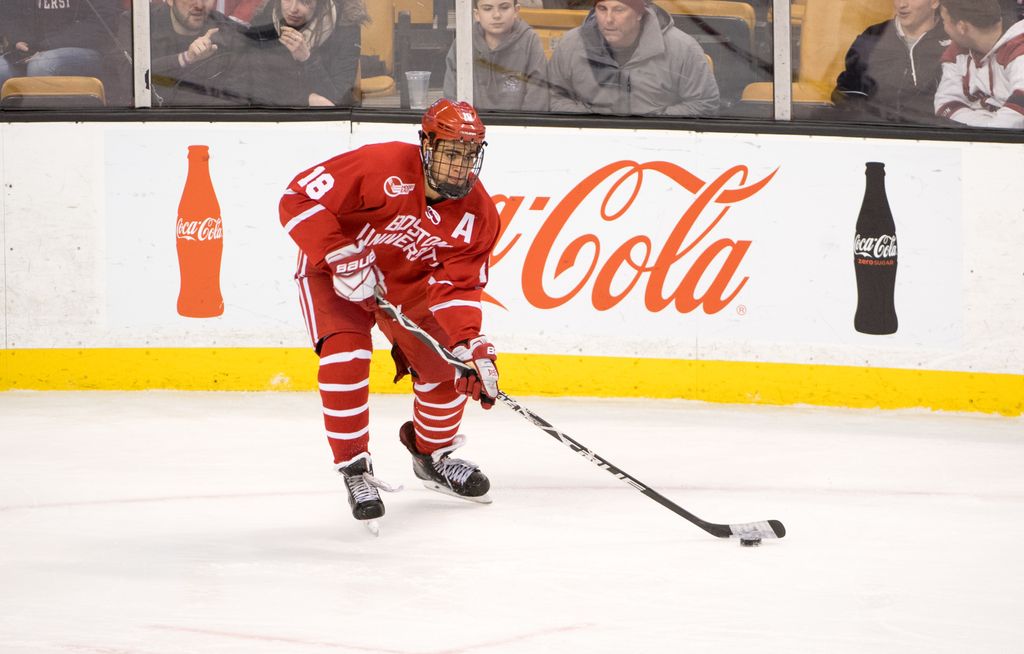
Jordan Greenway (CGS’17, CAS’19) in 2018 was the first Black hockey player to play for Team USA in the Winter Olympics
Mike Grier starred for BU in the mid-1990s, and enjoyed a stellar 14-year career in the National Hockey League, where he became the first American-born Black player to score 20 goals in a season (left). Jordan Greenway (CGS’17, CAS’19) in 2018 was the first Black hockey player to play for Team USA in the Winter Olympics (right).
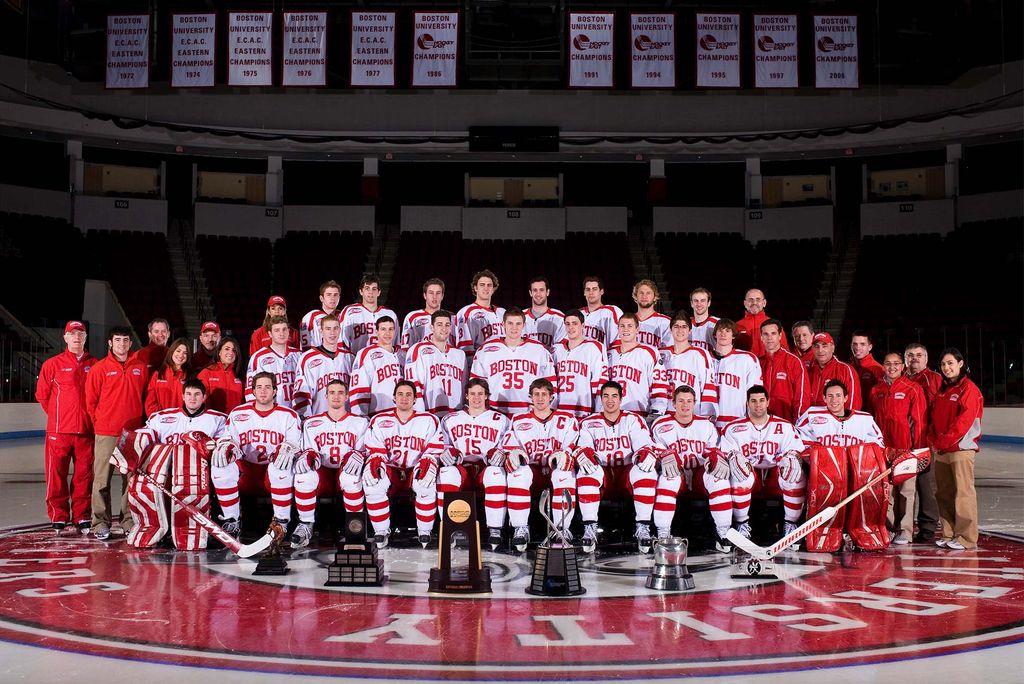
The 2008-09 BU men’s hockey team adopted the motto “Burn the boats,” a phrase associated with Spanish conquistador Hernan Cortes, meaning that failure is not an option. The Terriers went on to take every trophy they competed for that year

Jack Eichel (CGS’16) won the 2015 Hobey Baker Award as a BU freshman, finishing the season just one win away from sweeping the Beanpot, Hockey East, and NCAA titles. He was recently traded to the NHL’s Vegas Golden Knights after playing for the Buffalo Sabres.
The 2008-09 BU men’s hockey team adopted the motto “Burn the boats,” a phrase associated with Spanish conquistador Hernan Cortes, meaning that failure is not an option. The Terriers went on to take every trophy they competed for that year (left). | Jack Eichel (CGS’16) won the 2015 Hobey Baker Award as a BU freshman, finishing the season just one win away from sweeping the Beanpot, Hockey East, and NCAA titles. He was recently traded to the NHL’s Vegas Golden Knights after playing for the Buffalo Sabres (right).
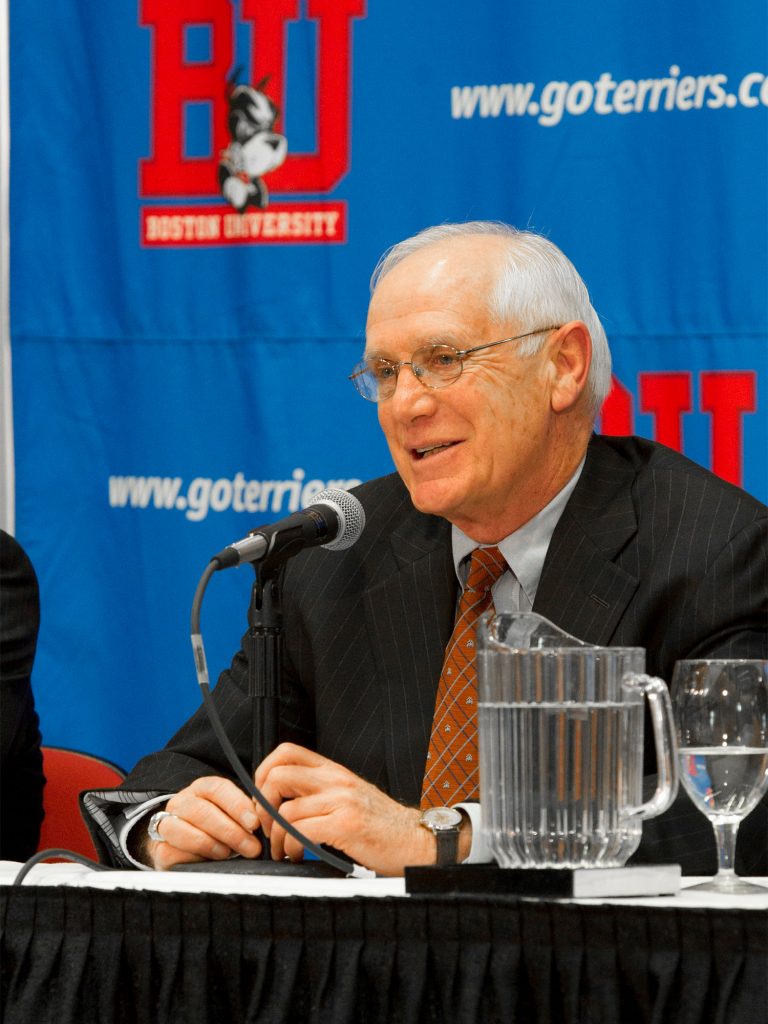
Jack Parker (Questrom’68, Hon.’97) announcing his retirement in March 2013, after four decades as head coach.
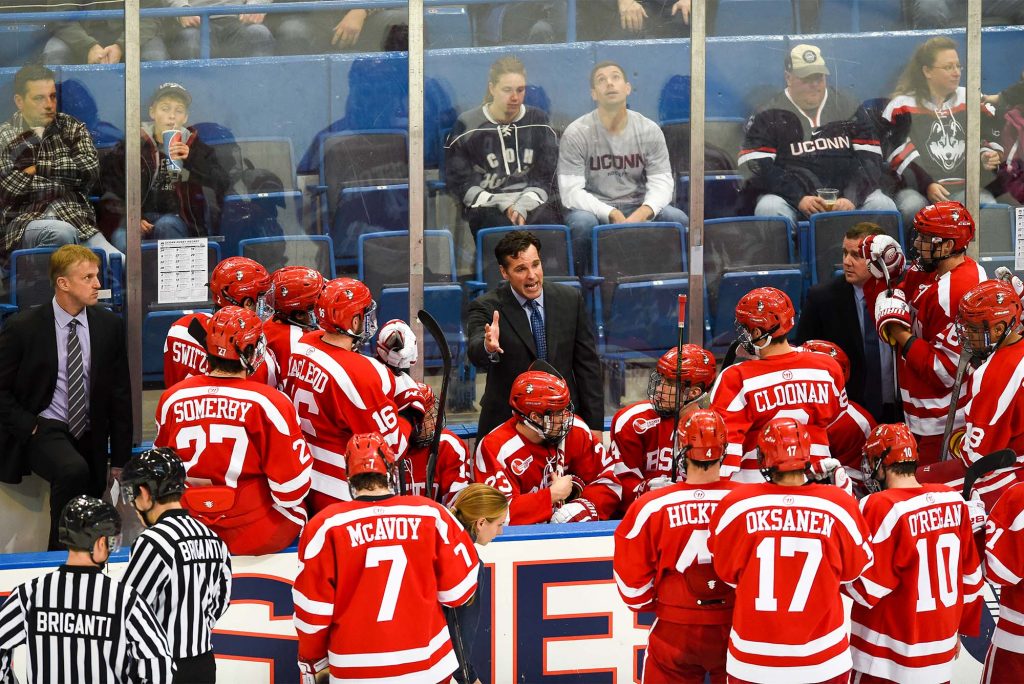
Former Terrier David Quinn (CAS’89) (center) won more than 100 games in five seasons as head coach at BU before taking over the NHL’s New York Rangers in 2018. He’s currently coaching the USA Men’s Hockey Olympic team.

Albie O’Connell (CAS’99), now in his fourth year as head coach, was an assistant and associate head coach under David Quinn (CAS’89).
Jack Parker (Questrom’68, Hon.’97) announcing his retirement in March 2013, after four decades as head coach (left). | Former Terrier David Quinn (CAS’89) won more than 100 games in five seasons as head coach at BU before taking over the NHL’s New York Rangers in 2018. He’s currently coaching the USA Olympic Men’s Hockey Team (center). | Albie O’Connell (CAS’99), 1998-99 season Terrier captain and now in his fourth year as head coach, was an assistant and associate head coach under David Quinn (CAS’89) (right).
Comments & Discussion
Boston University moderates comments to facilitate an informed, substantive, civil conversation. Abusive, profane, self-promotional, misleading, incoherent or off-topic comments will be rejected. Moderators are staffed during regular business hours (EST) and can only accept comments written in English. Statistics or facts must include a citation or a link to the citation.